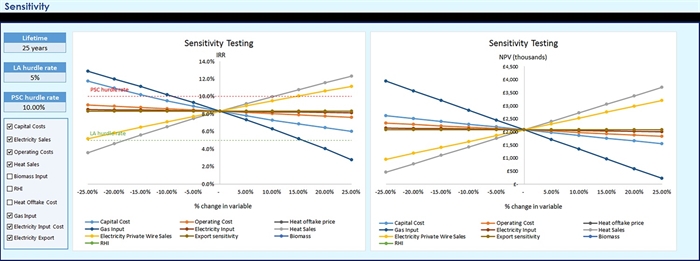24.10.16
Heat network investments: getting the numbers right
Source: PSE Oct/Nov 16
Tanja Groth, decentralised energy manager at the Carbon Trust, explains why the organisation has launched a District Heating Cashflow Quality Assurance Template to assist public sector bodies in their investment decision-making.
Courtesy of the Round 6 delivery funding from the Heat Network Delivery Unit at the Department for Business, Energy and Industrial Strategy (BEIS), 130 local authorities have now received grant support to conduct studies investigating the feasibility of district heating networks across the UK.
Transforming these initial studies into concrete projects will be further bolstered by the impending launch of the Heat Networks Investment Project, with its £320m of capital to catalyse up to £2bn private sector investment into heat networks, as announced in the 2015 Autumn Spending Review.
We are quickly nearing the moment where the first of these studies will have reached the procurement stage, transitioning from paper-based designs into pipes in the ground, helping the UK to secure a cost-effective, low-carbon heat supply. To ensure smooth delivery, it is critical that the industry continues to develop and use robust, quality-assured analysis to help deliver this ambitious market growth while maximising carbon and energy savings. The Carbon Trust is proud to continue to support more than one out of 10 of such local authority-led heat network studies in the UK.
Lack of standardisation and transparency
It is in the course of the delivery of this support we have noticed troubling industry-wide disparities in the development of the accompanying Excel-based economic and financial models which are critical to investment decision-making.
In particular, the lack of standardisation and transparency in heat network investment models have been cited as barriers by the private sector, as they require time-consuming quality assurance procedures and often do not contain sufficient data to make an informed investment decision.
Standardisation and transparency across other elements of the heat network industry have been aided by the CIBSE Code of Practice for Heat Networks for technical specifications and the likes of the Heat Trust and FairHeat for consumer heat tariff setting. Additionally, BEIS is expected to publish a set of project development guidance documents for the heat network sector imminently.
Unfortunately, no comprehensive criteria have been available for the design and content of the Excel-based investment models developed to evaluate heat network projects.
Even the simplest Excel models are likely to contain errors. Rigorous quality assurance by third parties is industry best practice for ensuring that such errors have negligible impact on the calculations which are used for investment decision-making.
Where the resources or skills to conduct Excel quality assurance are not readily available, this critical element gets forgotten or disregarded.
This can have serious repercussions on project development, particularly where local authorities are relying on investment calculations to make decisions on which, if any, projects are progressed. Even what appear to be minor errors in a single spreadsheet can have knock-on effects throughout the rest of the model, overstating or understating the key investment metrics by a substantial margin.
Finding these errors can be excruciatingly difficult and time consuming, as they are often hidden in rows of equations and are not obvious at a glance. However, when these errors make the difference between a project going ahead or not, the decision to not spend time on quality assurance can results in tens, if not hundreds, of thousands of pounds of misspent money.
District Heating Cashflow Quality Assurance Template
In order to aid the public sector in determining the need for quality assurance and to promote transparency and standardisation, the Carbon Trust has launched a District Heating Cashflow Quality Assurance Template. This template is made freely available to all UK public sector bodies for the purpose of internal quality assurance, and was officially launched at the Carbon Trust headquarters on 20 September.
The model works on two levels: the first is by inputting summary numbers from the model you are testing into the template. This allows you to check whether the summary investment calculations are broadly comparable across the two models, and whether additional quality assurance will be necessary. The second, more detailed level, allows for a richer analysis of the model inputs, as illustrated by the sensitivity testing graphs.

FOR MORE INFORMATION
E: [email protected]
W: www.carbontrust.com
Tell us what you think – have your say below or email [email protected]